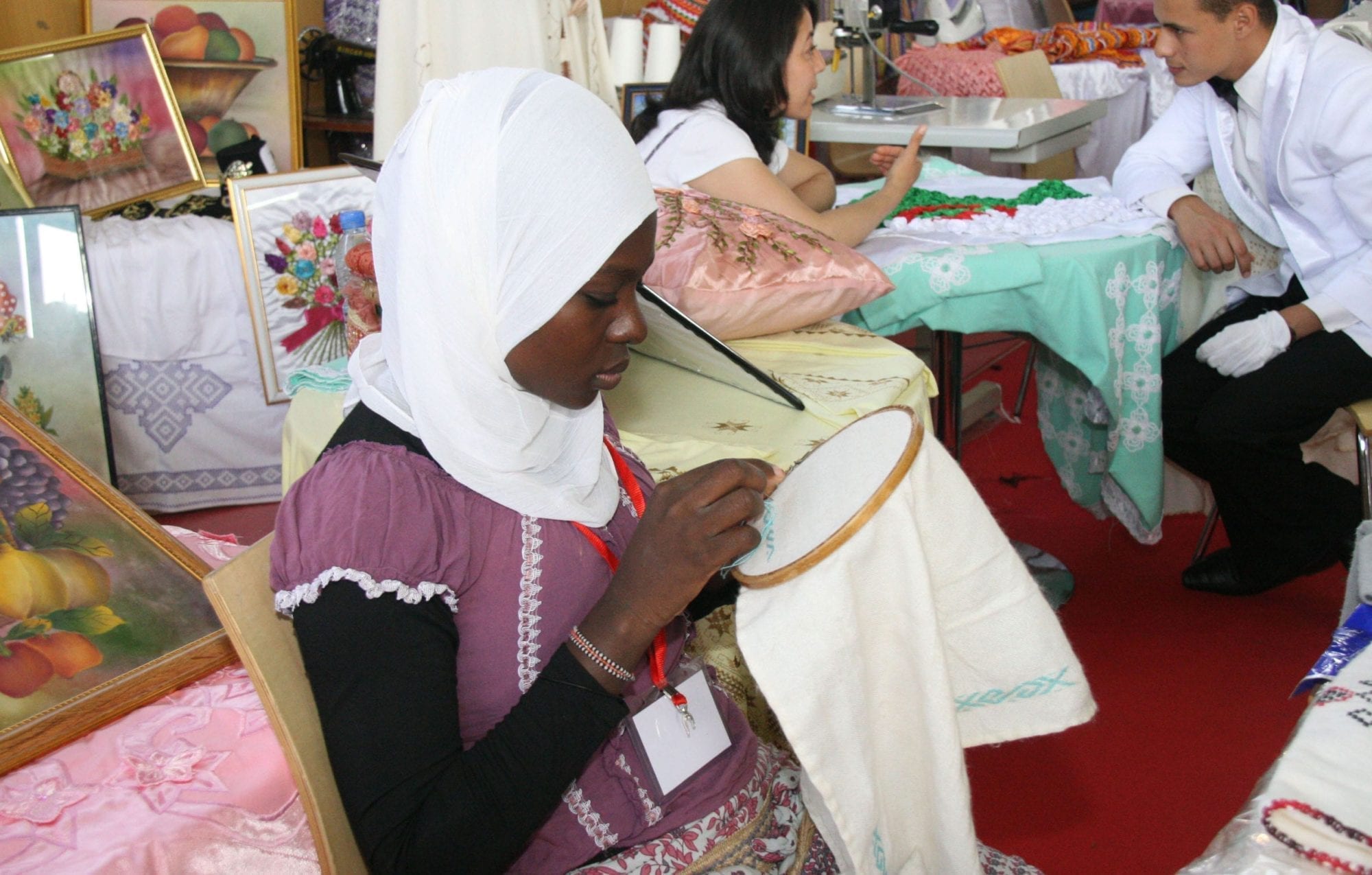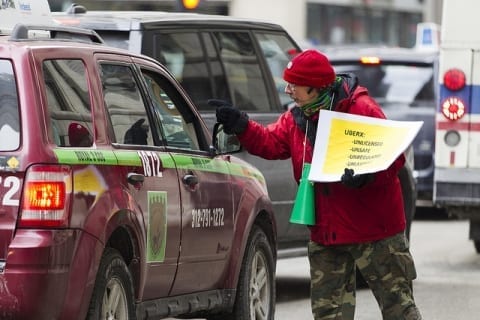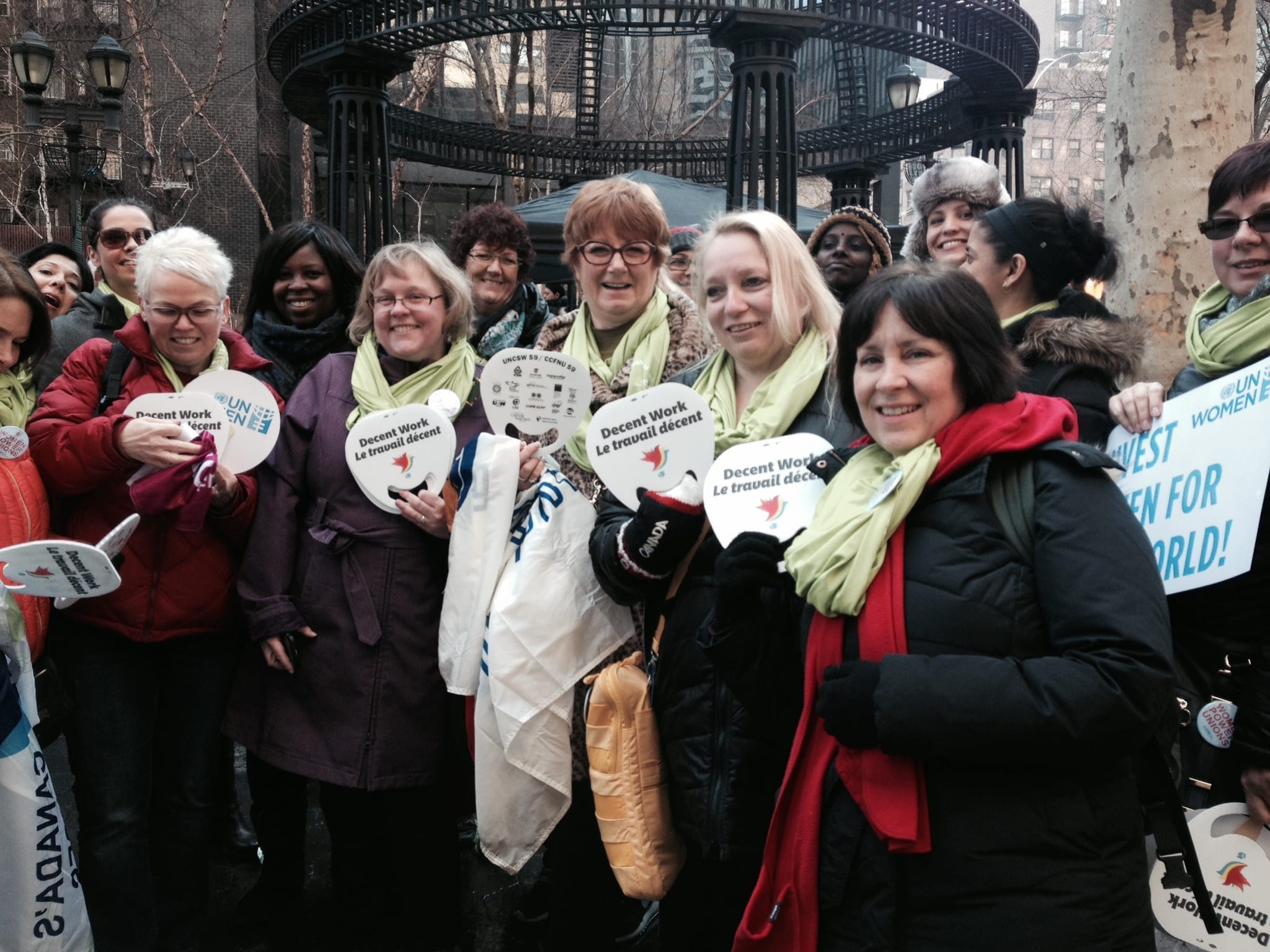
Sep 24, 2015
A vigil tonight at the United Nations kicks off events around the world body’s broad new 17-point agenda that aims in part to end extreme poverty, eradicate hunger and ensure clean water and sanitation. The 193 UN member states have debated the Sustainable Development Goals (SDGs) over past three years and in coming days likely will commit to work toward achieving them by 2030.
The 17 goals include 169 targets, an ambitious agenda whose success will depend upon governments and civil society working together, according to UN Secretary General Ban Ki Moon. But fundamental to the entire plan is Goal No. 8, “Decent Work and Economic Growth,” says Shawna Bader-Blau, Solidarity Center executive director.
“Pernicious economic and social inequality is most obvious where the rights of working people are most denied,” Bader-Blau wrote in a recent Huffington Post article. “And no effort to mitigate inequality within and among countries will succeed without a committed movement to protect and bolster those rights.”
Key Goals in Decent Work and Economic Growth
Decent Work and Economic Growth includes the following key goals:
- By 2030, achieve full and productive employment and decent work for all women and men, including for young people and persons with disabilities, and equal pay for work of equal value.
- By 2020, substantially reduce the proportion of youth not in employment, education or training.
- Take immediate and effective measures to eradicate forced labor, end modern slavery and human trafficking and secure the prohibition and elimination of the worst forms of child labor, including recruitment and use of child soldiers, and by 2025 end child labor in all its forms.
Another critical target is protecting worker rights and promoting safe and secure working environments for all workers, “including migrant workers, in particular women migrants, and those in precarious employment.”
“People should not have to leave their human rights at the border when they migrate,” Bader-Blau said this week on the Kojo Nnamdi radio show in Washington, D.C.
Gender Equality Essential for Broad-Based Prosperity
Achieving gender equality, Goal No. 5, also is essential to attaining broad-based prosperity. A new study released today estimates that tackling gender inequality and boosting women’s job opportunities could add $12 trillion to the annual gross domestic product (GNP).
The “Gender Equality” goal includes as one of its top targets the elimination of all forms of violence against women and girls in the public and private sphere—a scourge that is prevalent even in the workplace, where 30 percent to 40 percent of workers report gender-based violence, a figure that rises to 90 percent in some jobs.
Building accountable institutions and ensuring access to justice (Goal No. 16 and Goal No. 17), and implementing social protections systems, one of the targets of Goal No. 1, also are essential components of the new 15-year plan.
The SDGs replace the eight UN Millennium Development Goals (MDGs), which included halving extreme poverty, halting the spread of HIV/AIDS and providing universal primary education by 2015.

Mar 20, 2015
United Nations Women announced today it is cutting ties with the ride share company Uber, after unions and other civil society groups protested that the company’s business model perpetuates precarious work—job instability, lack of health insurance and other social benefits, and little labor law protection.
Uber had said it would create 1 million jobs for women, a benchmark unions say is meaningless unless those jobs are stable, safe and provide wages sufficient to support families.
“There was an immediate rejection by unions and NGOs (nongovernmental organizations) of this idea of a million jobs that we knew were likely to be insecure, ill paid and potentially unsafe,” says Brigitta Paas, International Transport Workers’ Federation (ITF) vice president.
The decision to partner with Uber, announced during the opening days of the Commission on the Status of Women (CSW) meeting last week, outraged CSW participants, who organized a global union statement and public protest.
“Uber economics is the most aggressive informalization of an industry which was already deregulated three decades ago,” the global union Public Services International (PSI) said last week. “Indeed, it represents exactly what the women’s movement has been fighting for decades.”
In many cities and countries, taxi drivers are union members with good wages and benefits, the opposite of the Uber model. By classifying drivers as “independent contractors,” Uber denies them basic protections, from minimum wage pay to health care and other benefits on the job. PSI cited Uber research that “revealed drivers’ average annual earnings of $15,000 and a proliferation of part-time work.”
Further, says International Trade Union Confederation (ITUC) General Secretary Sharan Burrow, “Uber does not create jobs—it replaces existing, regulated, taxi jobs with low-paid, precarious and exploitative work.”
“Unions rose up at the CSW, analyzed why the partnership was harmful to women and showed how unions and the economic empowerment they fight for, are key to gender equality,” says Lisa McGowan, Solidarity Center senior specialist for gender equality. “Decent wages, social benefits, stable employment—all are fundamental to achieving gender equality.”

Mar 10, 2015
As more than 8,500 union members and other civil society activists gather at the United Nations in New York for the Commission on the Status of Women meeting, new research shows women have made some gains in the two decades since the landmark global meeting on women in Beijing but continue to suffer from economic insecurity and widespread discrimination and inequality in the workplace.
Fewer women are in the workforce today, according to a report by the International Labor Organization (ILO). In 1995, 52 percent of women and 80 percent of men were in the workforce, the ILO report finds. Today the participation rate for women is 50 percent, compared to 77 percent for men, reflecting in part the effects of the global recession.
Further, ILO research shows that women continue to be overrepresented in low-wage jobs that offer little security and few, if any, benefits. Women are paid 77 cents for every dollar a man makes—a rate that means women will not achieve pay equity with men before 2086. Women also work many hours without pay, a point made by an interactive, online report produced by the Bill & Melinda Gates Foundation, Clinton Foundation and Economist Intelligence Unit.
Unions are sponsoring several workshops and events during the CSW meetings, including a March 11 panel discussion, “Women’s Economic Empowerment and Labor Rights: Beijing +20 and Beyond.” Sponsored in part by the Solidarity Center, the panel will discuss how working women are fighting for fair wages and working conditions, equal job opportunities, freedom from sexual harassment and other forms of gender-based violence. Panelists include AFL-CIO International Department Director Cathy Feingold, Bangladesh garment worker activist Kalpona Akter and Elizabeth Tang, general secretary of the International Domestic Workers Federation (IDWF).
This year’s CSW meeting marks 20 years since the fourth women’s world conference in Beijing, when 189 governments identified and signed an agreement to improve 12 areas key to empowering women, including “the persistent and increasing burden of poverty on women.” During the next two weeks, CSW participants will review progress made in implementing the Beijing recommendations. Some 164 countries conducted national reviews of the status of women, and the CSW will review these reports, along with contributions from civil society.
“Governments acknowledge that women’s labor sustains families and nations,” says Lisa McGowan, Solidarity Center senior specialist for gender equality. “It is time that governments step up and devote the full political commitment and resources needed to sustain women, and ensure their labor and human rights.”
Established in 1946, the CSW is the principal global intergovernmental body exclusively dedicated to the promotion of gender equality and the empowerment of women
The UN yesterday approved a political declaration on the status of women and girls. Union activists and women’s and human rights groups say that the negotiations leading up to the adoption of the Political Declaration at UNCSW59 were held in advance, and consultation with civil society was kept to a minimum. As a result, the content of the declaration is not as strong and forward-looking as it could have been.
The change in process has been denounced by more than 1,000 organizations, including Public Services International (PSI), Education International (EI), the International Trade Union Confederation (ITUC) and the Canadian Labour Congress. Historically, the CSW has adopted declarations or “agreed conclusions” after a two-week session that includes robust civil society participation.
Other trade union events during the CSW include a discussion on organizing migrant women and decent work for domestic workers, and an event on “Women and Sustainable Economy from a Human Rights Perspective.” More events here.



